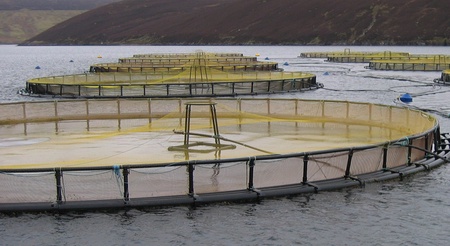The environmental efficiency of Scottish fish farms could potentially be increased by carefully selecting their locations, according to a University of Aberdeen study.
Researchers say decision makers who approve the location and size of fish farms would benefit from a better understanding of how current speed relates to seabed sediment-type and the communities of organisms living there: Interactions between these variables appear to have a role in determining how a fish farm impacts on the natural environment.
Decision makers use a mathematical model to help determine the optimum size of a fish farm for any proposed location; the Scottish Government has recently issued a call for research to look at the effectiveness of this process.
Uneaten fish food and fish faeces from fish farms impact on the seabed by enriching this environment with organic matter. In turn, this affects the communities of marine organisms that live and feed there.
Lead researcher Dr Daniel Mayor, from the University of Aberdeen’s Oceanlab, said: “The physical properties of the seabed, and also the communities of organisms that are found there, play a role in determining how a fish farm impacts on the natural environment.
“Coarse sediments that are found in areas of high current speed may physically trap waste such as uneaten fish food and fish faeces.
“This results in waste accumulating in these areas, counteracting the beneficial effects of waste dispersal by faster moving waters. The organisms that live in higher flow regimes tend to be filter feeders which are susceptible to smothering by the sinking particulate wastes.
“Better understanding of how current speeds influence sediment properties and the biological communities that live on and in the seabed has the potential to allow us to optimise the location of future fish farms.
“Our findings will be of interest to managers and decision makers who decide where fish farms should be located.”
The study - which appears in the science journal Environmental Research - builds on earlier work by the team into the environmental effects of fish farming in Scotland. Their previous study showed that bigger fish farms may not have a bigger environmental impact on the seabed than smaller fish farms.
Dr Martin Solan, co-author of both studies and also based at Oceanlab, said: “Our earlier work involved a desktop study using data from over 50 farms around Scotland to understand the relationship between farm size and environmental impact.
“We followed this up in the field and confirmed our previous conclusions - when it comes to the environmental impact of fish farming, it is not only farm size that matters. Other factors, such as local conditions and farm practices, need to be considered."
The production of Atlantic salmon in Scotland generates in excess of £400 million annually and provides hundreds of jobs in rural areas.
Salmon farming in Scotland is licensed and regulated by the Scottish Environment Protection Agency.
Their research was funded by the Scottish Aquaculture Research Forum, a registered charity and an independent company whose main aim is to support research into aquaculture and related areas.
· The University of Aberdeen together with the University of St Andrews will bring marine scientists from all over the world to Aberdeen from September 26-30 when both institutions host the World Conference on Marine Biodiversity.


